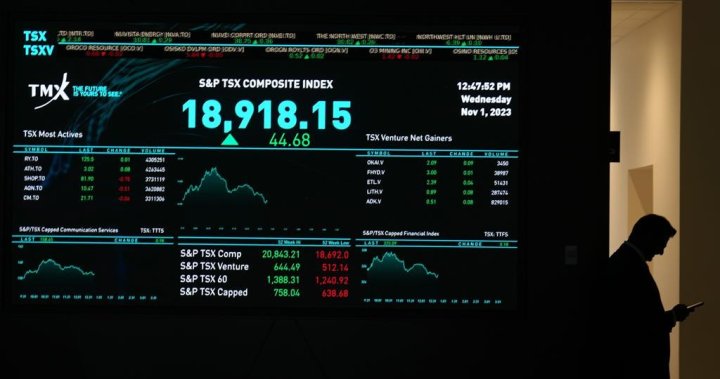Canada’s main stock index dipped on Monday while U.S. markets rose, keeping American stocks near record highs.
The S&P/TSX composite index slipped 51.22 points to 21,587.88.
In New York, the Dow Jones industrial average was up 188.94 points at 38,778.10. The S&P 500 index was up 41.63 points at 5,473.23, while the Nasdaq composite was up 168.14 points 17,857.02.
In both countries, markets are still acclimating to the first cut to the benchmark interest rate in Canada in four years earlier this month, as well as the U.S. Federal Reserve’s decision to hold rates steady last Wednesday.
“The market continues to absorb the Federal Reserve decision last week and the Bank of Canada decision the week before. We saw a little bit of movement on the U.S. side, but Canada is flat for the day,” said Ashish Utarid, assistant vice-president of investment strategy at IG Wealth Management.
The TSX drop was in part from Shopify, the country’s largest e-commerce company, which saw share prices slip slightly after starting to climb their way back from an early May tumble.
Breaking news from Canada and around the world
sent to your email, as it happens.
A bump in industrial stocks helped to balance out the losses. Transport sector heavy-hitters Canadian Pacific Kansas City Ltd., Bombardier Inc. and CargoJet Inc. all enjoyed gains.
“As interest rates get cut in Canada, you’ve got companies with high burdens of debt, and if they’re able to refinance in the next couple of years at a lower rate, it could boost earnings potentially,” Utarid said.
Canadian Pacific and Bombardier both face hefty debt loads after a massive acquisition and tough pre-pandemic stretch, respectively.
Despite the S&P/TSX composite’s middling performance next to its U.S. counterparts, Utarid remained upbeat about the Toronto exchange’s prospects, pointing to homebuilding data as one bright spot.
Last month, the annual pace of housing starts climbed 10 per cent compared with April, helped by gains in Montreal and Toronto, Canada Mortgage and Housing Corp. said Monday.
“Housing starts means there’s a little bit more optimism for someone to dive in and purchase a home even at interest rates at this level,” Utarid said.
“We know that when you have more houses being built, six to eight months from now you’ve got people moving into those houses, and then they’ve got to buy furniture and put things inside. So that can be optimistic for the Canadian economy.”
The Canadian dollar traded for 72.76 cents US compared with 72.72 cents US on Friday.
The July crude oil contract was up US$1.88 at US$80.33 per barrel and the July natural gas contract was down nine cents at US$2.79 per 1,000 cubic feet.
The August gold contract fell US$20.10 to US$2,329 per ounce and the July copper contract was down five cents at US$4.45 a pound.
© 2024 The Canadian Press



